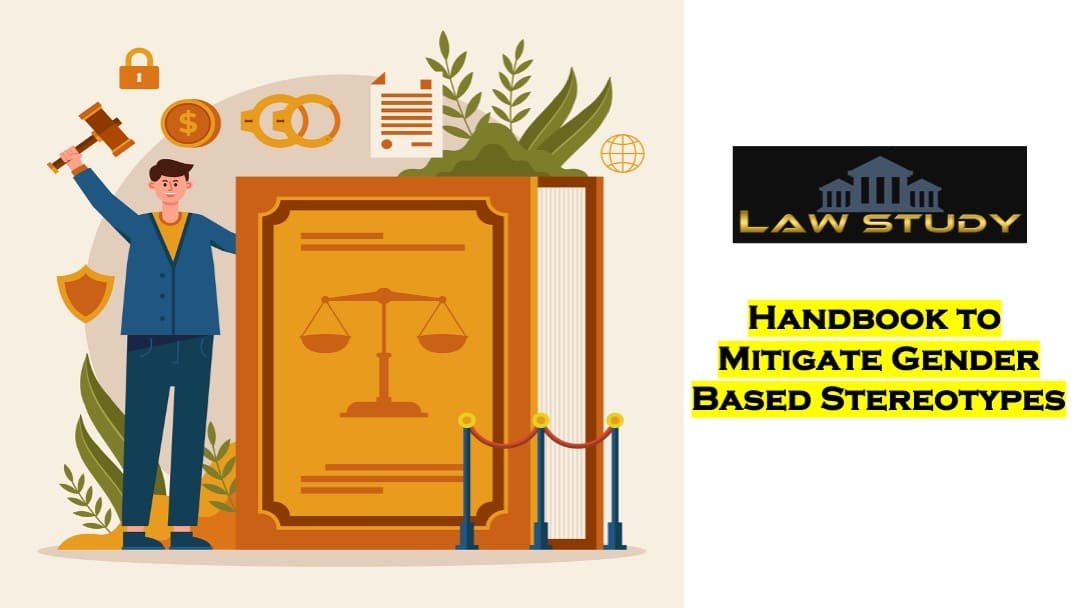Handbook to Mitigate Gender-Based Stereotypes
In a trailblazing endeavor that marks a significant milestone for gender equality in the legal arena, the Supreme Court of India has unveiled a groundbreaking initiative led by Chief Justice of India (CJI) Dhananjaya Y Chandrachud. This innovative effort takes shape in the form of an exhaustive handbook titled “Handbook on Combating Gender Stereotypes.”
The handbook’s official introduction by CJI Chandrachud heralds a monumental stride towards eradicating deeply entrenched gender biases that often manifest through legal language. The handbook offers a meticulously curated compilation of terms and expressions, intended to guide judges and legal practitioners away from language that perpetuates regressive gender stereotypes. These stereotypes, if left unchecked, can cast shadows over the impartiality of legal judgments.
A Revolution in Linguistic Norms
Delving into a comprehensive array of commonly used phrases related to women, children, and sexual offenses, the handbook proposes alternative terms that are neutral, respectful, and devoid of prejudiced connotations. Derogatory terms such as “slut” and “harlot” are to be replaced with the term “woman.” Additionally, designations like “Indian woman” or “career woman” are recommended to be simplified to the term “woman.”
The handbook also underscores the importance of using language that promotes gender equality in discussions concerning marital dynamics and relationships. It advocates for the avoidance of adjectives like “dutiful” and “obedient” when describing a spouse. Instead, the handbook suggests adopting terms like “homemaker” in lieu of the outdated “housewife.” Moreover, it encourages the use of the phrase “relationship outside marriage” rather than the ambiguous term “affair.”
Illuminating the Shadows of Preconceived Notions
When dealing with matters of sexual crimes, the handbook firmly advocates for employing language that respects the dignity of all individuals involved. It urges the replacement of problematic terms, recommending the use of “sex worker” over “prostitute” and suggesting the precise term “street sexual harassment” in place of the often-misused “eve-teasing.”
Empowering Judges and Legal Professionals
CJI Chandrachud underscores that the handbook’s primary objective is to equip judges and legal practitioners with the tools to identify, comprehend, and challenge stereotypes that have long haunted discussions involving women. By enhancing the fairness and impartiality of legal decisions, this initiative strives to reshape the legal landscape into one that upholds justice and equality.
Though the handbook is not binding, its significance lies in its potential to revolutionize the way legal discourse unfolds by dismantling deeply rooted gender biases. It advocates for legal proceedings that are guided by principles of fairness and objectivity, thus eradicating the perpetuation of discriminatory practices.
Dissecting Stereotypes’ Influence on Judicial Reasoning
The handbook delves further by delving into the cognitive patterns that stereotypes can introduce into judicial decisions. By examining these reasoning patterns, the handbook highlights the risk of misinterpretations, such as the assumption that all women universally aspire to motherhood or are inherently overly emotional.
Rejecting Misconceptions and Fostering Understanding
In addition to addressing stereotypes, the handbook challenges misconceptions by asserting that a person’s attire or habits should not be considered as contributing factors to sexual offences. It emphasizes that clothing choices represent personal expressions, independent of any implications related to sexual intentions.
Condemning Victim-Perpetrator Marriages
The handbook takes a firm stance by vehemently condemning the notion that marrying a rape survivor to the perpetrator can rectify the crime. It argues that such unions do not restore honor; instead, they magnify trauma and could potentially perpetuate further acts of violence.
A Collaborative Effort for Transformative Change
The comprehensive content of the handbook is the result of the collaborative efforts of a subcommittee within the Supreme Court’s e-Committee. Esteemed justices Moushumi Bhattacharya and Pratibha Singh, along with academician Jhuma Sen, have played pivotal roles in shaping this pioneering initiative.
A Brighter Future for Equitable Legal Discourse
The Supreme Court’s introduction of this handbook is a resolute stride towards realizing its overarching mission of dismantling deeply rooted gender biases from legal discussions. This endeavor is poised to foster a more just, impartial, and inclusive legal ecosystem, thereby advancing the principles of fairness and equality.

























